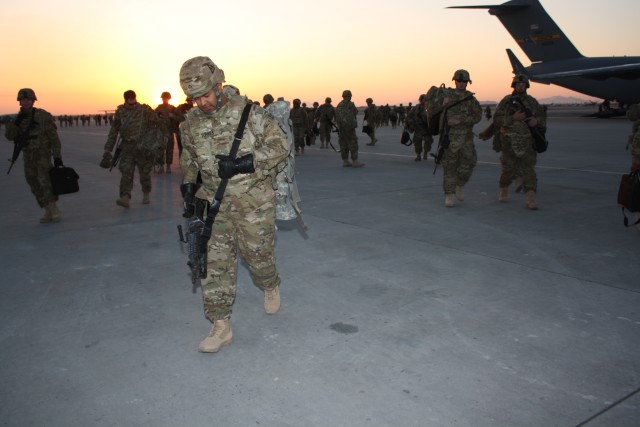
KANDAHAR AIRFIELD, Afghanistan (Feb. 21, 2011) -- Task Force Thunder, composed of the 159th Combat Aviation Brigade and its subordinate battalions, started its relief in place in Regional Command - South, here, with its sister brigade, the 101st Combat Aviation Brigade (Task Force Destiny), in early February.
Both Task Force Thunder and Task Force Destiny hail from Fort Campbell, Ky., and are subordinate brigades of the 101st Airborne Division, which is the only division in the Army with two combat aviation brigades.
"We both fall under the 101st, and we share similar training standards," said Maj. Randy Spell, the executive officer for Task Force Thunder. "When we take over missions, the guys on the ground aren't going to see a change in the type of support they're getting from the air."
As Task Force Thunder flows into Afghanistan, its personnel and equipment participate in the complex process of reception, staging and onward integration, which prepares them to take over their role as the main aviation element of the regional command.
This process includes receiving the Soldiers into theater, receiving equipment, and building aircraft and other critical systems. Gradually, these systems will replace Task Force Destiny's and assume operations here.
Maj. Jason Kahne, the unit support operations officer, played an integral role in the RSOI process, coordinating the flow of all personnel and aircraft from Fort Campbell to Regional Command South.
"The most difficult part of this is synchronizing the aircraft flow," Kahne said. "As Task Force Destiny is pulling their aircraft out of the fight, we have to be able to inject ours, and that means we have to move the right mix of personnel for build teams into Afghanistan in conjunction with the airframes."
The build teams are the Soldiers who prepared the aircraft for transport to Afghanistan by folding blades and disassembling various parts to make the helos more compact for transport. These same Soldiers are responsible for reassembling the aircraft in theater.
While the teams are putting the aircraft back together, pilots and their crews have to participate in academics that prepare them for the missions they will fly in the extreme conditions of Afghanistan. Once the aircraft buildup is complete, the helos undergo modifications that protect crews flying through hostile areas. Then it's time for maintenance test flights.
The maintenance test flights highlight another important part of RSOI. It's not just the Soldiers and aircraft that have to make it into theater at the right time. There are also multiple containers filled with the smaller pieces of equipment that are critical to the mission.
In total, Kahne and his staff facilitated the movement of nearly 73,000 square feet worth of equipment and containers. Among these smaller pieces of equipment were some of the tools and parts the maintainers need to fix the helicopters when they require service.
Also inside those containers were some of the creature comforts that will help get the approximately 2,500 Soldiers of Task Force Thunder through the year away from home. Before they could pull those comfort items out of their containers, they had to have a place to call their home away from home.
Capt. Luke Chivers, the brigade mayor, was responsible for that part of the RSOI process.
"As the brigade mayor, I'm responsible for the everyday living conditions of the Soldiers, from making sure they have beds to making sure the showers are working."
Chivers has the difficult task of balancing needs versus wants.
"There are certain things that are non-negotiable; these are things that cause illness or safety issues," he explained. "Those things are priorities. Everything beyond that, we have to have a compelling argument for. We have to make sure we aren't asking for more than any other Soldier is getting."
In addition to making sure the Soldiers have a place to hang their hats, Chivers also coordinates their reception when they arrive in theater.
"The mayor cell sets the tone for the whole deployment," he said. "Travelling is tough, so if you start off received properly by your unit, spend the minimum amount of time in the passenger terminal and can move right into billeting, it helps the morale out a lot.
"But if the RSOI process isn't done correctly, Soldiers are losing their most valuable asset, and that's time," Chivers said.
That time is particularly critical during the relief in place and transfer of authority, when Task Force Thunder Soldiers have a limited amount of time to get their equipment up and running, and assume their roles in supporting Regional Command - South.
Related Links:
159th Combat Aviation Brigade on Facebook

Social Sharing